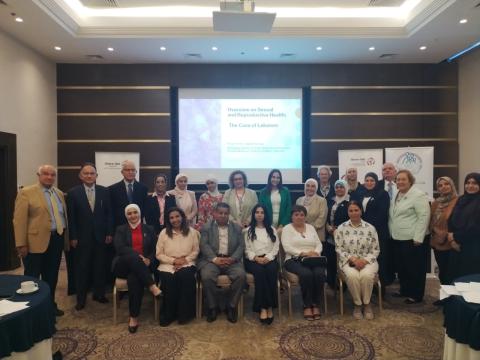

The Higher Population Council and Share-Net Jordan held a regional meeting Sunday June 11th on priorities, programs and challenges related to reproductive and sexual health within the framework of expanding the scope of work of Share-Net Jordan at the regional level. The meeting aimed to assess and review issues, priorities, challenges and the current situation of sexual and reproductive health in Jordan, Egypt and Lebanon. Three working papers were presented during the meeting. Professor Issa Al-Masarweh, HPC Secretary-General, presented the first paper: ‘Reproductive and Sexual Health in the Hashemite Kingdom of Jordan: Issues and Needs.’ The paper addressed features of sexual and reproductive health through a comprehensive perspective for all population groups distributed over three life phases being: the stage of pre-marriage, the stage of marriage and starting a family, and the stage of old age. The intended purpose of the paper was to identify issues related to reproductive and sexual health and reproductive rights in Jordan and also show the needs in the field of services and research related to reproductive health. Another aspect the paper addressed was to point out shortages in the implementation of relevant policies, programs and legislation.
Professor Hassan Zaki from the American University in Cairo (AUC) presented the second paper which dealt with the current situation and trends in reproductive and sexual health dimensions in Egypt. The paper also addressed the main strategies related to sexual and reproductive health issues, in addition to the main stakeholders working in this field. Moreover, the key initiatives and activities related to sexual and reproductive health currently carried out in Egypt were also reviewed.
Jocelyn DeJong, Professor at the Faculty of Health Sciences, American University of Beirut (AUB) , presented the third paper which gave an overview of ‘a comprehensive outlook of the state of sexual and reproductive health in Lebanon’ highlighting the priorities of sexual and reproductive health, and the progress achieved over the past few years. The paper also discussed the strategies and policies that address reproductive and sexual health rights, challenges and obstacles to accessing sexual and reproductive health services, the quality of these services, and potential opportunities for improvement.
Dr. Sawsan Majali, acting as moderator, concluded the workshop with a dialogue session to discuss sexual and reproductive health priorities at the regional level with the participation of relevant experts and representatives of partner agencies working in the field of reproductive health in Jordan.
The workshop concluded with the following recommendations and suggestions
- The importance of exchanging experiences and lessons learned amongst countries of the region in raising the level of sexual and reproductive health of the population at all stages of the life cycle of individuals of both sexes
- the importance of making available accurate and comprehensive data and information for the purposes of research and study
- improving access to sexual and reproductive health information and services for adolescents
- working on common issues in the field of sexual and reproductive health
- forming committees of expert practitioners at the regional level to study these issues and develop practical measures to address them
- and finally, focus on the importance of exchanging experiences on how to integrate the concepts of sexual and reproductive health in the school curricula at the appropriate educational stages.
Representatives of a number of international institutions and Jordanian institutions and ministries participated in this meeting, namely: Ministry of Health, Ministry of Awqaf and Islamic Affairs and Holy Sites, Ministry of Education, the National Centre for Curriculum Development/ Ministry of Education, the Jordanian National Committee for Women's Affairs, the National Centre for Epidemics and Communicable Diseases, the Higher Council for the Rights of Persons with Disabilities, Institute for Family Health Care, Jordanian Association for Family Planning and Protection, Information and Research Centre/ King Hussein Foundation, University of Jordan/ College of Nursing , Princess Salma College of Nursing, Al al-Bayt University, Save the Children’s Fund, Jordan News Agency-Petra, and the UN International Organization for Migration/ UNIOM.
It is worth noting that the Higher Population Council is a host to Share-Net Jordan, which works to strengthen the bonds between research outcomes and scientific knowledge on the one hand, and policies and practices on the other. Share-Net Jordan operates through generating, disseminating and promoting the use of knowledge in the course of developing better policies and practices in the field of sexual and reproductive health. The Higher Population Council is the link at the national level with Share-Net International which was founded by the Ministry of Foreign Affairs of the Kingdom of the Netherlands. Share-Net International acts as a knowledge base that brings together the experiences of Dutch institutions, partners from the southern hemisphere, and international institutions operating in the field of reproductive health. Share-Net International was founded with the aim of strengthening the role of knowledge in building evidence-based policies and practices and ensure the strategic use of resources to create a platform supportive of research in the field of reproductive health.







